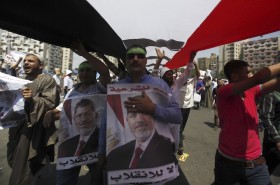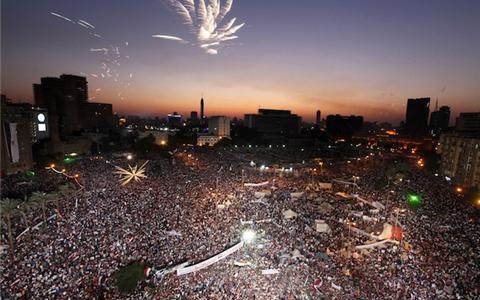 At least 11 people have been killed and hundreds injured in violence in Egypt as rival protesters filled the streets to support and oppose the removal of president Mohamed Morsi by the army. Unidentified gunmen shot dead three people and injured several more on Saturday in an attack on a rally opposing the rule of the military in Nasr City, Cairo. Al Jazeera’s Jamal Elshayyal, reporting from Nasr, said that there had been a stream of injured brought into a field hospital in Nasr City. Doctors inside had reported four dead, he added. The shooting attack came hours after police fired tear gas to disperse anti-coup protesters who had tried to block the October 6 bridge in Nasr. the Interior Minister Mohamed Ibrahim said that the Muslim Brotherhood protests in the city would be cleared “soon and in a legal manner”. In Egypt’s second largest city, Alexandria, seven people were reported killed in clashes between pro- and anti-army rule prostesters. Security forces had also moved in on an anti-coup sit-in at Qaed Ibrahim mosque in the city. Interior Minister Ibrahim said protests against military rule would be cleared in line with complaints by residents in the area. In a television interview the interim president, Adly Mansour, said that the government “cannot accept security disorder, cutting roads and bridges. The state has to impose order by all force and decisiveness.” The interior minister, Mohamed Ibrahim, echoed Mansour’s words, stating that protesters against military rule would be dispersed “in a legal manner” Egypt had been bracing for a night of protest on Friday following army chief Abdel Fattah el-Sisi’s call on Wednesday for his supporters to give the army a mandate to “fight terrorism”. The main pro-army protests took place in Cairo’s iconic Tahrir Square and outside the presidential palace. “The people, the source of all power, mandate the army and police to purge terrorism,” read a banner stretched across the entrance to Tahrir. Tanks guarded the entrance to the square, military helicopters buzzed overhead, and police officers mingled with the crowd, posing for photographs. It was all a far cry from the usual scene over the past two-and-a-half years, when protesters in Tahrir routinely clashed with police and denounced the army. “The army are here to protect the people, they don’t lie,” said Ezzat Fahmi, 38, who said Sisi called the rallies “to show the entire world that the Egyptian people don’t want the [Muslim] Brotherhood anymore.” Leaders of Tamarod, the petition campaign that collected signatures calling for Morsi’s ouster, endorsed Friday’s protests, enouraging their supporters to help “cleanse Egypt”. But some revolutionary movements, including the April 6 youth movement, rejected Sisi’s call for rallies. ‘The dictatorial police state’ Morsi’s Muslim Brotherhood and its remaining political allies had been planning their own mass rallies for more than a week. Thousands of their supporters gathered outside of a mosque in the Nasr City district, and near Cairo University, both the sites of ongoing protests since Morsi’s ouster. “He is fueling more anger from one sector against another sector,” said Maged Osman, a 25-year-old Morsi supporter, referring to Sisi’s call for protests. The pro-army rallies were intended to overwhelm the pro-Morsi crowd’s numbers and demonstrate public support for the army. It has also raised fears – and hopes, among some Egyptians – that the army is planning a major crackdown on the Brotherhood. “It is either victory over the coup or martyrdom,” said Mohamed el-Beltagy, a leading member of the Muslim Brotherhood, in a speech to the crowds. Spotlight Follow our ongoing coverage of the political crisis in Egypt Earlier on Friday, the state news agency reported that Morsi is being held for 15 days while prosecutors investigate claims that he conspired with the Palestinian group Hamas to carry out attacks during Egypt’s 2011 revolution. A spokesman for the Brotherhood said the charges showed the “complete bankruptcy of the leaders of the bloody coup.” Egyptians “reject the return of the dictatorial police state and all the repression, tyranny and theft it entails,” Ahmed Aref said in a statement. Jen Psaki, a spokeswoman for the US state department, expressed concern about the investigation. “I can’t speak to the specific charges. But we do believe that it is important that there be a process to work toward his release,” she said.
At least 11 people have been killed and hundreds injured in violence in Egypt as rival protesters filled the streets to support and oppose the removal of president Mohamed Morsi by the army. Unidentified gunmen shot dead three people and injured several more on Saturday in an attack on a rally opposing the rule of the military in Nasr City, Cairo. Al Jazeera’s Jamal Elshayyal, reporting from Nasr, said that there had been a stream of injured brought into a field hospital in Nasr City. Doctors inside had reported four dead, he added. The shooting attack came hours after police fired tear gas to disperse anti-coup protesters who had tried to block the October 6 bridge in Nasr. the Interior Minister Mohamed Ibrahim said that the Muslim Brotherhood protests in the city would be cleared “soon and in a legal manner”. In Egypt’s second largest city, Alexandria, seven people were reported killed in clashes between pro- and anti-army rule prostesters. Security forces had also moved in on an anti-coup sit-in at Qaed Ibrahim mosque in the city. Interior Minister Ibrahim said protests against military rule would be cleared in line with complaints by residents in the area. In a television interview the interim president, Adly Mansour, said that the government “cannot accept security disorder, cutting roads and bridges. The state has to impose order by all force and decisiveness.” The interior minister, Mohamed Ibrahim, echoed Mansour’s words, stating that protesters against military rule would be dispersed “in a legal manner” Egypt had been bracing for a night of protest on Friday following army chief Abdel Fattah el-Sisi’s call on Wednesday for his supporters to give the army a mandate to “fight terrorism”. The main pro-army protests took place in Cairo’s iconic Tahrir Square and outside the presidential palace. “The people, the source of all power, mandate the army and police to purge terrorism,” read a banner stretched across the entrance to Tahrir. Tanks guarded the entrance to the square, military helicopters buzzed overhead, and police officers mingled with the crowd, posing for photographs. It was all a far cry from the usual scene over the past two-and-a-half years, when protesters in Tahrir routinely clashed with police and denounced the army. “The army are here to protect the people, they don’t lie,” said Ezzat Fahmi, 38, who said Sisi called the rallies “to show the entire world that the Egyptian people don’t want the [Muslim] Brotherhood anymore.” Leaders of Tamarod, the petition campaign that collected signatures calling for Morsi’s ouster, endorsed Friday’s protests, enouraging their supporters to help “cleanse Egypt”. But some revolutionary movements, including the April 6 youth movement, rejected Sisi’s call for rallies. ‘The dictatorial police state’ Morsi’s Muslim Brotherhood and its remaining political allies had been planning their own mass rallies for more than a week. Thousands of their supporters gathered outside of a mosque in the Nasr City district, and near Cairo University, both the sites of ongoing protests since Morsi’s ouster. “He is fueling more anger from one sector against another sector,” said Maged Osman, a 25-year-old Morsi supporter, referring to Sisi’s call for protests. The pro-army rallies were intended to overwhelm the pro-Morsi crowd’s numbers and demonstrate public support for the army. It has also raised fears – and hopes, among some Egyptians – that the army is planning a major crackdown on the Brotherhood. “It is either victory over the coup or martyrdom,” said Mohamed el-Beltagy, a leading member of the Muslim Brotherhood, in a speech to the crowds. Spotlight Follow our ongoing coverage of the political crisis in Egypt Earlier on Friday, the state news agency reported that Morsi is being held for 15 days while prosecutors investigate claims that he conspired with the Palestinian group Hamas to carry out attacks during Egypt’s 2011 revolution. A spokesman for the Brotherhood said the charges showed the “complete bankruptcy of the leaders of the bloody coup.” Egyptians “reject the return of the dictatorial police state and all the repression, tyranny and theft it entails,” Ahmed Aref said in a statement. Jen Psaki, a spokeswoman for the US state department, expressed concern about the investigation. “I can’t speak to the specific charges. But we do believe that it is important that there be a process to work toward his release,” she said.

Jul272013
